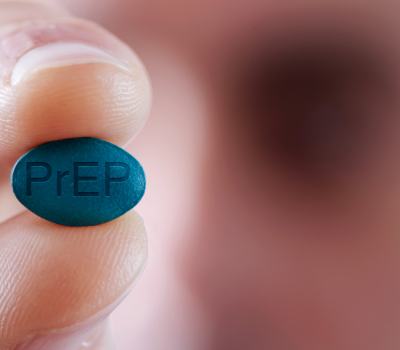
HIV PrEP (pre-exposure-prophylaxis)
PrEP is a medication that can prevent HIV infection. It is intended for people who are at (sexual) risk and for whom using condoms is not (always) possible. This includes men who have sex with men (MSM), transgender individuals, sex workers, and people with a sexual partner from a region where HIV is highly prevalent.
The information on this webpage is intended for general informational purposes only and is not a substitute for professional medical advice, diagnosis, or treatment. Always consult a doctor or other qualified healthcare professional if you have questions about PrEP or your health.
Last updated: 16 January 2026
About HIV-PrEP
PrEP stands for pre-exposure prophylaxis. It is a prevention method that is already used in other contexts, such as the contraceptive pill for women.
HIV negative individuals can take antiretroviral medication before engaging in high-risk situations to prevent infection. However, PrEP does not offer full protection against HIV and does not protect against other sexually transmitted infections (STIs).
At present, only Emtricitabine + Tenofovir Disoproxil 200+245 mg/day is approved for use as PrEP in Belgium. Several generic versions of the same product are available.
Please read the information below carefully if you are considering using PrEP. Refer back to this page after starting PrEP if you have further questions. You can also consult our FAQ at the bottom of the page for essential and up-to-date information.
Who is eligible for PrEP?
Men who have sex with men (MSM) and who:
Have had unprotected anal sex with at least two partners in the past six months;
Have been diagnosed with at least two STIs (e.g., syphilis, chlamydia or gonorrhea) in the past twelve months;
Have needed PEP (post-exposure prophylaxis) more than once in the past twelve months;
OR use chems (drugs) during sexual activities.
Other individuals at high risk:
People who do sex work or clients of sex workers who engage in unprotected sex;
People who travel to countries with high HIV prevalence and have unprotected sex there;
Partners of someone living with HIV who has a detectable viral load;
People who are at high risk of HIV infection due to unprotected sex;
People who inject drugs and share needles or syringes.
Make an appointment
Interested in starting PrEP? Make an appointment at our clinic to discuss your options. PrEP users are required to have a check-up with a doctor every three months, who will provide the necessary prescriptions.
PrEP use
There are two regimens you can follow to use PrEP: daily and event-driven (also known as on-demand). The daily regimen can be used by anyone. The event-driven regimen is only recommended to people in certain situations.
Daily PrEP use
Schedule
Take one pill every day, always at the same time and within a four-hour window (from two hours before to two hours after your chosen time).
Example: You take one pill every day at 8 pm. You have a four-hour window: from 6 pm to 10 pm.
Tip: Choose a time that you’re less likely to forget, both on weekdays and weekends.
Important
You are only fully protected two hours after taking the second pill (in other words: 26 hours after the first pill).
Did you vomit within 30 minutes of taking a pill? Take another pill.
Women are only fully protected after seven days!
Forgot to take a pill?
Did you miss one pill (one day) and were you at risk of HIV? Take the pill as soon as you realise you missed it, and then continue taking PrEP as usual.
Did you miss more than one pill (several days) and were you at risk of HIV? Take a double dose of PrEP (two pills) as soon as possible, then take one pill per day until you can contact a healthcare provider.
Event-driven PrEP for cisgender men and transgender women* who do not use hormones*
*Women who were assigned male at birth
Schedule
Take at least four pills over three days:
Take two pills (double dose) no later than two hours before sexual contact (but not more than 24 hours in advance).
Then take one pill 24 hours and one pill 48 hours after the (last) sexual contact.
Always take at least two pills after any unprotected anal contact.
Never stop your intake too early!
Important
Always take the pills at the same time of day, within a four-hour window (from two hours before to two hours after the intended time).
Did you vomit within 30 minutes of taking a pill? Take another pill.
Forgot to take a pill?
Did you miss the double dose? Take a double dose of PrEP (two pills) as soon as possible, then take one pill per day until you can contact a healthcare provider.
Did you take the double dose but miss the pill after the risk exposure? You can take the missed pill up to 12 hours after the usual time. Has it been more than 12 hours? Take a double dose of PrEP (two pills), then take one pill per day until you can contact a healthcare provider.
Event-driven PrEP for other groups*
*Other groups include:
cisgender women
transgender women (women who were assigned male at birth) who use hormones
transgender men (men who were assigned female at birth)
Schedule
Take at least four pills over three days:
Take two pills (double dose) no later than two hours before sexual contact (but not more than 24 hours in advance).
Then take one pill every 24 hours, at the same time each day, and continue for 7 days after your last sexual contact.
Never stop your intake too early!
Important
Always take the pills at the same time of day, within a four-hour window (from two hours before to two hours after the intended time).
Did you vomit within 30 minutes of taking a pill? Take another pill.
Forgot to take a pill?
Did you miss the double dose? Take a double dose of PrEP (two pills) as soon as possible, then take one pill per day until you can contact a healthcare provider.
Did you take the double dose but miss the pill after the risk exposure? You can take the missed pill up to 12 hours after the usual time. Has it been more than 12 hours? Take a double dose of PrEP (two pills), then take one pill per day until you can contact a healthcare provider.
Interaction between PrEP and other medication
There is one important interaction between PrEP and anti-inflammatory drugs, specifically with:
Diclofenac (e.g. Voltaren)
Ibuprofen
Naproxen (may cause kidney damage!)
Combining PrEP with paracetamol (e.g. Tylenol) is safe.
There are other possible interactions. Always consult a doctor or pharmacist before combining PrEP with other medications.
Source: HIV Drug Interactions Checker (University of Liverpool)
Additional information
PrEP does not provide full protection against HIV and offers no protection against other sexually transmitted infections (STIs).
After a request from the PrEP doctor, your health insurance fund approves the medication electronically. Your doctor will issue an electronic prescription. You can then go to the pharmacy with your eID. A box of 90 pills costs approximately €15.
It is important to schedule a check-up every 6 months at the ITM clinic. You will also receive the necessary prescriptions there. Be sure to schedule your appointment in time!
Are you experiencing sexual problems or issues related to chemsex? Make an appointment with a sexologist at ITM (at the reception desk or through your nurse or doctor).
Frequently Asked Questions (FAQ) on PrEP
What is PrEP?
PrEP stands for 'Pre-Exposure-Prophylaxis'. The concept is familiar from other situations: women take the contraceptive pill before sexual contact. If you are travelling to a malaria country, you start your anti-malaria pills before you leave. Vaccines are also a kind of PrEP: you get vaccinated so as not to get sick. For HIV: HIV-negative people take HIV inhibitors to prevent HIV infection.
PrEP only protects against HIV
Taking PrEP will not protect you from other STIs (sexually transmitted infections). So the message is clear. PrEP does not replace the use of condoms, it is added as a prevention tool. You can still get other STIs if you take PrEP and stop using condoms.
PrEP protects against HIV if you take the pills!
Very solid scientific research and clinical trials show that PrEP intake significantly reduces the risk of HIV infection in people who took the medication correctly. It sounds simplistic but it is true: PrEP only works if you take your pills correctly.
PrEP works, but HIV infection is still possible!
That sounds contradictory. We all know that taking pills on a strict schedule is extremely difficult, especially if you have to keep it up for a long period of time. The scientific research shows that PrEP gives a very high protection rate, over 90%, if the pills are taken correctly.
But outside the context of scientific research, the follow-up and support is less intensive. So in 'real life', there is a chance that you will forget the PrEP pills, not always take them according to schedule, or for some reason cannot get a new supply in time. And then, of course, the protection is a lot less.
What do PrEP pills look like?
Currently, only Truvada® is recommended as PrEP. It is one pill that contains two HIV inhibitors: Tenofovir and Emtricitabine.
Advantages and disadvantages of PrEP
There are advantages to PrEP, absolutely! The chance of contracting HIV is much lower.
A possible disadvantage: PrEP does not protect against other STIs. Some STIs are difficult to treat and most can go undetected with possible long-term complications.
Some PrEP researchers have found that people use condoms less and are therefore more susceptible to contracting other STIs. On the other hand, they hear stories about people who are just more aware of sex and therefore use condoms more.
There are also social drawbacks to PrEP. Some people have prejudices about PrEP. "People on PrEP would become sexually disinhibited and certainly not use condoms anymore," is one idea that is prevalent.
You can also look at it another way: people take PrEP to deal with their health in a positive way. Often, PrEP intake will also be temporary. You could also call it a positive bias: people go to a counsellor/doctor to stay healthy, in this case by taking PrEP pills.
A good remedy for PrEP prejudice is to understand the scientific basis of PrEP. Then it becomes a subject like any other. You then realise above all: it works! It is a positive contribution to HIV prevention for a very specific group of people. When the contraceptive pill was introduced in the 1960s, there were also a lot of prejudices about it. Women were said to be completely disinhibited. Surely you can't give that to women!
Another disadvantage: PrEP pills can have unwanted side effects.
Why do I need to see a doctor to receive PrEP?
Our government has decided to reimburse PrEP from 1 June 2017. They are attaching a number of conditions to it: the PrEP will be subject to strict reimbursement criteria and PrEP users must be closely monitored in HIV Reference Centres.
PrEP pills are indeed no sweets. We also know from experience that people have many questions about PrEP: Does it work? How to take it? How long will I be protected after taking it? Tips for not forgetting the pills? How to protect myself against other STIs? How to get the pills? How often should I take them?
This is best done in a personal conversation with a doctor and/or a specialised nurse.
Are you already infected with HIV?
We have to be sure that you are not already infected with HIV. PrEP consists of two HIV-inhibitors. Two HIV inhibitors are certainly not enough to suppress the HIV virus if you already have HIV without knowing it. Therefore, you should first have an HIV test with your doctor.
Kidney damage due to PrEP
PrEP HIV inhibitors can cause side effects including a type of 'kidney irritation'. Kidney damage is possible, but rarely permanent if detected in time. If you stop taking Truvada® it will disappear again. The doctor does regular laboratory tests to detect side effects. PrEP experts advise against taking high doses of anti-inflammatories (medical term: NSAIDs) together with Truvada®. Anti-inflammatories can also cause kidney problems.
STI/HIV tests
Other sexually transmitted diseases are also checked regularly: HIV, chlamydia, gonorrhoea, hepatitis C, syphilis, ...
How can I obtain PrEP pills?
Since 1 June 2017, a certain category of people can obtain PrEP in HIV Reference Centres.
The category eligible for PrEP is strictly defined based on an assessment of HIV risk. It is best to find out if you are eligible for PrEP by talking to a doctor.
Online ordering is not legally permitted in Belgium.
What does PrEP cost?
A box of 90 tablets of PrEP currently costs € 363,78 in Belgium. PrEP is reimbursed under certain conditions and costs in that case no more than € 15 per box.
How should I take PrEP pills?
Two different schedules are available if you want to take PrEP.
Schedule 1
The most studied schedule is the daily intake. This means taking PrEP every day, without interruption. People who never forgot to take their pills had a very high protection rate in clinical trials. 1 tablet of Truvada® per day, at the same time.
Schedule 2
Under certain circumstances, intermittent intake may be considered. You take PrEP only when you need it (i.e. around your sexual contacts). This is a little more complicated and you should discuss with your doctor and/or nurse which strategy suits you best. Schedule 2 is only permitted for men who have sex with men. It is not sufficiently effective for heterosexual contact.
Please note that with daily intake, the medication level is sufficiently high two hours after your second intake (from the second day onwards) to give you optimal protection against HIV.
If you choose to take them periodically, you will already be protected two hours after your first intake (from the first day)!
If you have forgotten to take the PrEP pills and you have had a risk contact: come for a PEP consultation as soon as possible at the PrEP centre where you will be followed up! If necessary, you will receive a course of PEP against HIV. PEP should be started within 72 hours after the risk moment and the sooner, the more effective! If your PrEP centre is not open, you can go to the emergency room for a starting dose (ZNA Stuivenberg in Borgerhout, UZA in Edegem or another university hospital in your neighbourhood).
Which doctors have experience with PrEP?
Doctors of Belgian HIV Reference Centres certainly have sufficient knowledge about PrEP. You should also inform your doctor that you are taking PrEP. For example, he or she can check whether other medicines may be taken together with PrEP pills.
How can I register for PrEP?
The RIZIV imposes a quarterly follow-up in the context of the reimbursement of Truvada® for PrEP. In practice, you will see a doctor and a nurse each time.
An initial consultation is scheduled to conduct a risk analysis, explain PrEP and determine laboratory analysis for HIV and STI. The application for reimbursement of PrEP will also be sent to the advisory doctor of your mutual health insurance company.
After a few weeks you will return for a second consultation where any questions you may have will be answered and your results discussed. You will then receive prescriptions for the PreP-medication and the necessary explanation about taking the medication. You will be asked to strictly not have any sexual risk contacts for about six weeks before starting PrEP. This is to avoid starting the medication during an initial HIV infection. When starting the PrEP medication, the HIV test will also be repeated.
We will ask you to come for a check-up every three months. Each time, a blood and urine test will be done to rule out HIV and STIs and to detect side effects of the PrEP medication. You can have this done about ten days before the scheduled appointment. In that case, the results will be discussed with you during the consultation. You may also choose to have the tests done during the consultation. In that case, you will be called if there are any abnormalities.
You will be asked to complete a short questionnaire each time.
During the consultation, your risk of HIV and STIs and your tolerance of the treatment will be checked. You will also be given the opportunity to ask any questions you may have.
You can request a consultation online at ITM under the heading 'HIV/AIDS examination'. Specialised PrEP consultations are scheduled for mornings. A doctor and a nurse are available to welcome and guide you in the framework of a PrEP treatment.
Does PrEP interact with other medicines?
If people take several medicines at the same time, they can influence each other's action: enhance, reduce or render ineffective. If your doctor, general practitioner or specialist prescribes something, he or she should check if it is compatible with the PrEP pills, Truvada®. Check the following websites for more information:
Where can I find more information about PrEP?
For more information about PrEP, please visit the following websites (in Dutch):
Prep (Sensoa)
Mannenseks (Sensoa)


